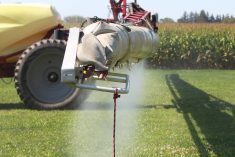The CETA trade agreement will eliminate European tariffs on many Canadian agricultural products:
The recent public wrangling and political theatre over glyphosate has been resolved in Europe, but the story is far from over, says a Canadian expert in pesticide regulations.
The European Commission announced June 28 that it would extend its approval of glyphosate for 18 months.
The decision came only two days before the EU registration for glyphosate, the most popular herbicide in the world, was slated to expire June 30.
European politicians and regulators have bickered over glyphosate for more than a year, following an International Agency for Research on Cancer report that classified the herbicide as “probably carcinogenic to humans.”
Read Also

Farming Smarter receives financial boost from Alberta government for potato research
Farming Smarter near Lethbridge got a boost to its research equipment, thanks to the Alberta government’s increase in funding for research associations.
Several agencies, including the European Food Safety Authority, issued their own studies and concluded that glyphosate does not cause cancer. However, France and several other nations insisted that the EC must ban glyphosate, the active ingredient in Roundup and dozens of generic herbicides.
Pierre Petelle, vice-president of chemistry with CropLife Canada, said the political fracas over glyphosate will persist.
“I don’t want to be the pessimist … but I don’t see it going away anytime soon,” he said.
“Their own food safety authority has said this is not a cancer issue, and you’ve even got the residue experts of the World Health Organization … saying, no, this is not a cancer issue…. And yet we still have this debate, and actually countries voting against the re-registration of glyphosate. It’s hard to be very optimistic.”
How the debate plays out will ultimately affect Canadian farmers because the country’s grains and oilseed sector would like to export more product to Europe.
The EU-Canada free trade deal, which has yet to be ratified, in-cludes elimination of European tariffs on a number of agricultural commodities and food, including wheat, canola oil and frozen french fries. However, the removal of financial tariffs is meaningless if the EU obstructs imports of Canadian products over chemical residues, including glyphosate.
“It’s kind of false hope,” Petelle said. “You think you’ve got a potential increase in market because you removed a financial barrier, (but) it’s very swiftly taken away when you add these non-tariff (barriers).”
A federal government website says the Canada-EU free trade agreement, known has the Comprehensive Economic and Trade Agreement, includes provisions to deal with things such as pesticide residues in grain.
“CETA establishes a mechanism under which Canada and the EU will co-operate to discuss, and attempt to prevent or resolve, non-tariff barriers that may arise for agricultural exports.”
Petelle said Canadian and European negotiators have to work out the details of the mechanism to prevent “non-tariff trade barriers (created) for purely political reasons.”
“It’s not spelled out … in the current wording that we’ve been privy to. That’s a concern,” he said from his Ottawa office.
“On crop protection … we advocate for a risk based approach. That’s a fundamental difference. Europe is going down the hazard based (regulatory) path.”
Gary Stanford, Grain Growers of Canada president, agreed that Canadian negotiators should push for a risk-based methodology, in which chemical safety is assessed according to real world exposures.
“There are always these political games that get played,” he said.
“We (need) to stay with the sound science.”
Europe is also debating regulations regarding endocrine disruptors, which are chemicals that interfere with the body’s hormonal system.
The regulations could potentially apply to numerous agricultural chemicals.
“Most of the fungicides currently used in Canada, using their definition, would qualify as endocrine disrupting substance s … and could potentially be banned,” Petelle said.
“When you start banning products based on supposed health rationales, according to EU regulations they’re (required to) remove the import MRLs.”
Consequently, Canadian producers might have to avoid applications of certain crop products if the grain or oilseed is destined for Europe.
Many Canadian farmers might wonder if the EU market for grain is worth the hassle, considering that the Europeans may be headed down a regulatory rabbit hole.
Petelle said Canadian producers shouldn’t forgo the opportunity because the EU is the largest food importer in the world.
Stanford said European regulations around food safety are highly political, but it’s difficult to abandon such an important market.
“We’re the largest exporter of durum in the world and a lot of (it) goes into southern (Europe),” he said.
“And we sell a lot of hard red spring wheat into the Warburton contract in the U.K.… It’s hard to give up on (Europe).”
CETA tariff removal
The CETA trade agreement will eliminate European tariffs on many Canadian agricultural products:
- Durum and high quality common wheat: Tariffs are now $190 per tonne and $122 per tonne, respectively.
- Canola oil: EU tariffs are 3.2 to 9.6 percent.
- Oats: EU tariffs are $114 per tonne.
- Barley and rye: EU tariffs are up to $120 per tonne.
- Processed pulses and grains: This category includes baked goods, pulse flour, meal and powder. EU tariffs start at 7.7 percent.


















